How to name your programme


Key takeaways
Taking this brief analysis into account, institutions should pay closer attention to the naming of their programmes, in particular:
- determining the scope of the programme (data science vs. data analytics);
- identifying keywords likely to garner student interest;
- recognising competitive landscapes; and
- evaluating the suitability of programme titles, including their length.
Using these points, your institution can not only gain a competitive edge over competitors, but better align a programme offer according to what students are currently interested in studying for their future careers.
Across the globe, hundreds of thousands of programmes are being offered, as institutions strive to capture the interest of prospective students looking to study either abroad or at home. This has naturally led institutions to grapple with the challenge of naming their programmes, as the title serves as one of the key factors enticing students when they search for their preferred study choice. Frequently, programme titles find themselves caught between the need to reflect the study’s scope, the expertise of the academics involved, and the incorporation of trending buzzwords. Nonetheless, the primary consideration in naming a programme should be aligning with the interests of prospective students and assessing how existing market offerings with similar names fare.
Based on this challenge, this article provides a brief examination of Master’s level Business & Management programmes over the past 24 months, with a particular focus on those incorporating either ‘Data Science’ or ‘Data Analytics’ in their titles. This exploration is prompted by the ongoing need for professionals who are proficient in data analysis, interpretation, and decision-making across various industries. By assessing the popularity and demand for ‘data science’ versus ‘data analytics’ within the business sector, valuable insights can be gleaned to refine programme development strategies and bolster recruitment efforts.
Overview of supply and demand
In the figure below, Master’s programmes within the field of Business & Management already receive a significant amount of pageviews, alongside institutions offering a solid supply of programmes. In this context, Business programmes with ‘Data Science’ or ‘Data Analytics’ in their title, although having received fewer pageviews and exhibiting a lower supply over the past 24 months, appear to outperform programmes in the broader Business & Management field. Each achieved a rate of 2,158 and 1,258 pageviews per programme respectively, compared to Business & Management’s 721 pageviews per programme.
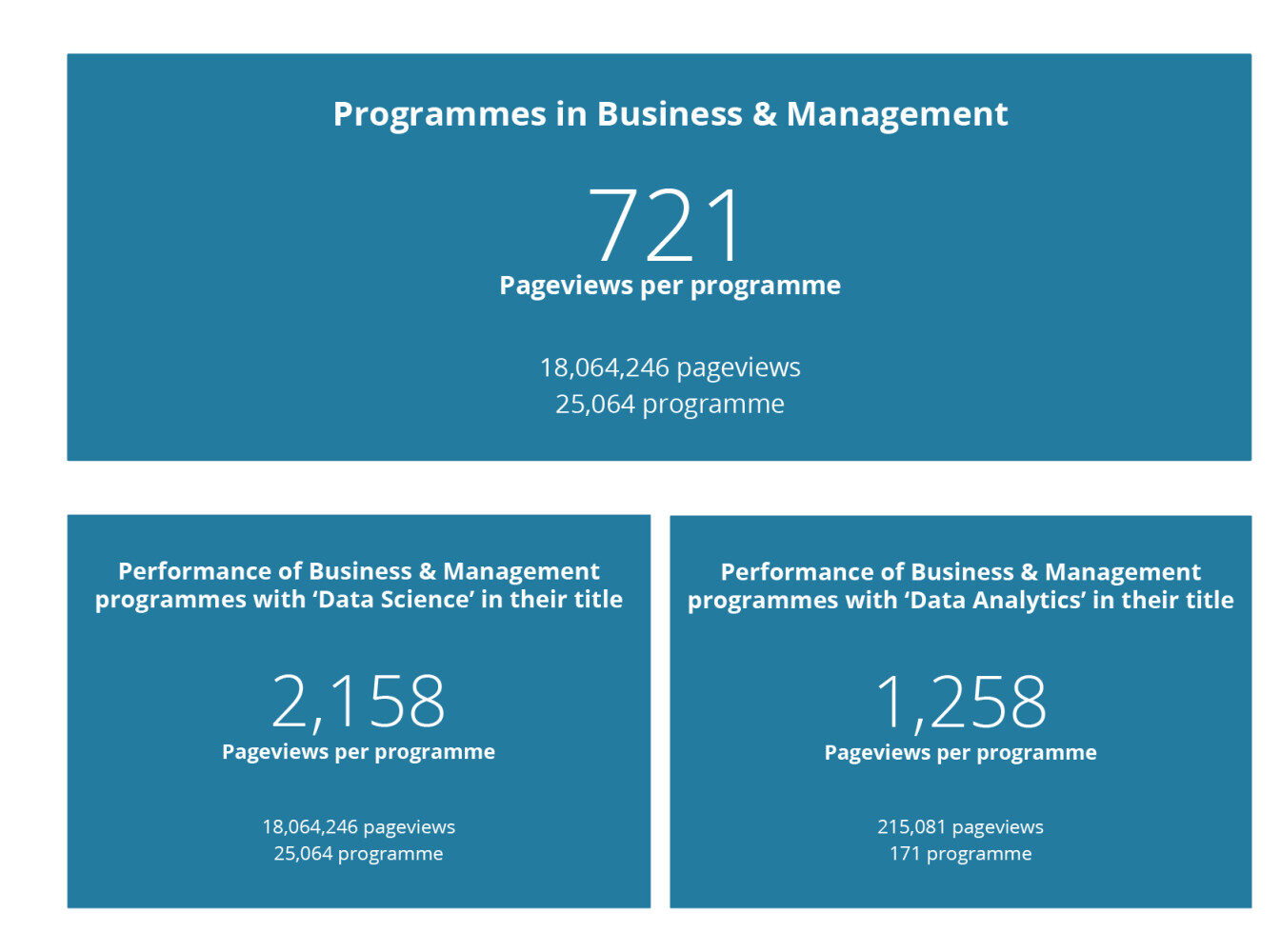
Delving deeper into the trends for each option, one can see different advantages offered when using either keyword. For instance, Business programmes that use ‘Data Science’ saw a steady increase in student interest in terms of pageviews over the last 24 months, with a slight uptick in supply over the same period. Meanwhile, those that incorporate ‘Data Analytics’ saw a stable flow of interest, but with more programmes including this keyword becoming available on the market. This shows that institutions strategically leverage the benefits from each keyword option to tailor their portfolio and marketing efforts in different ways.
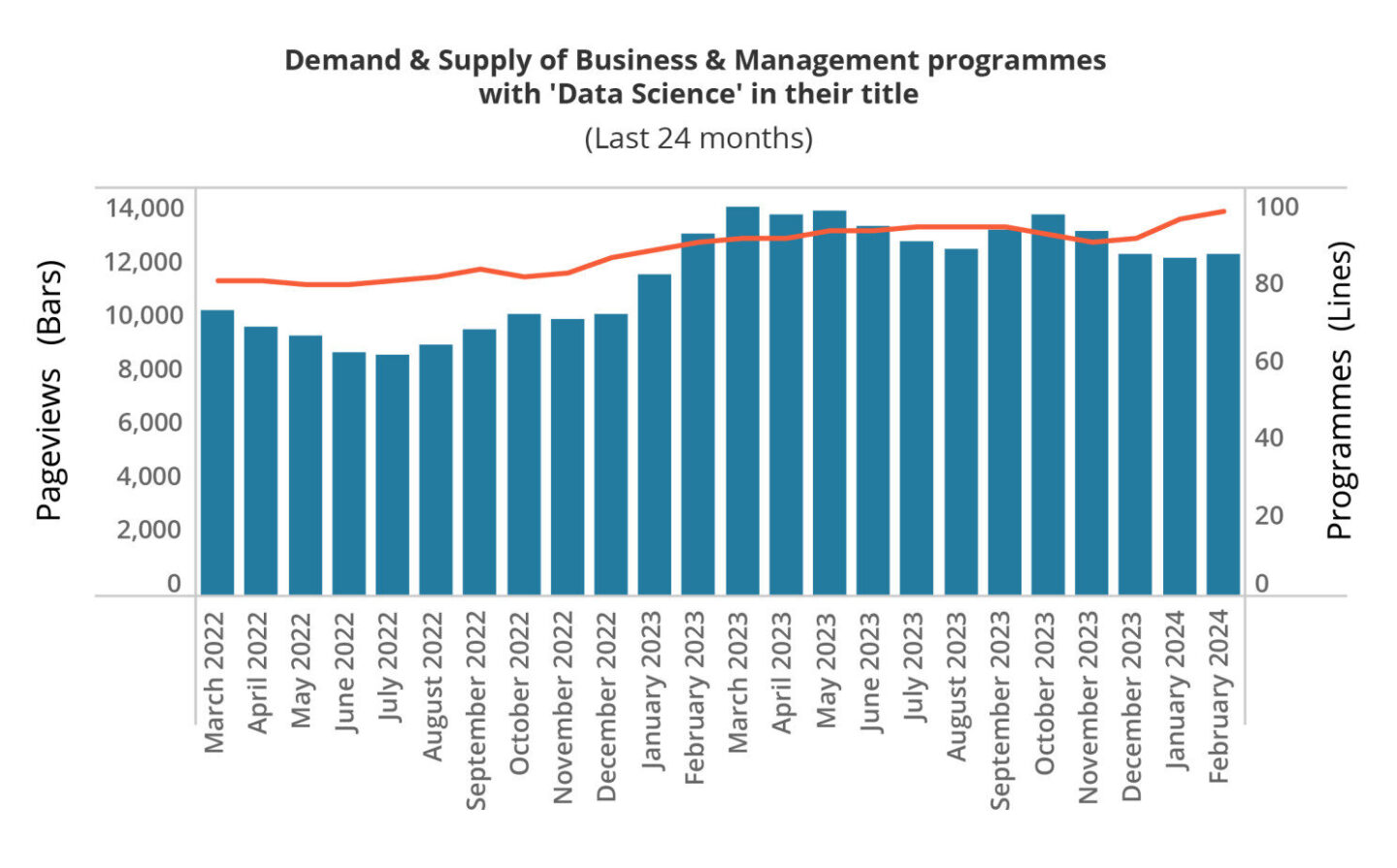
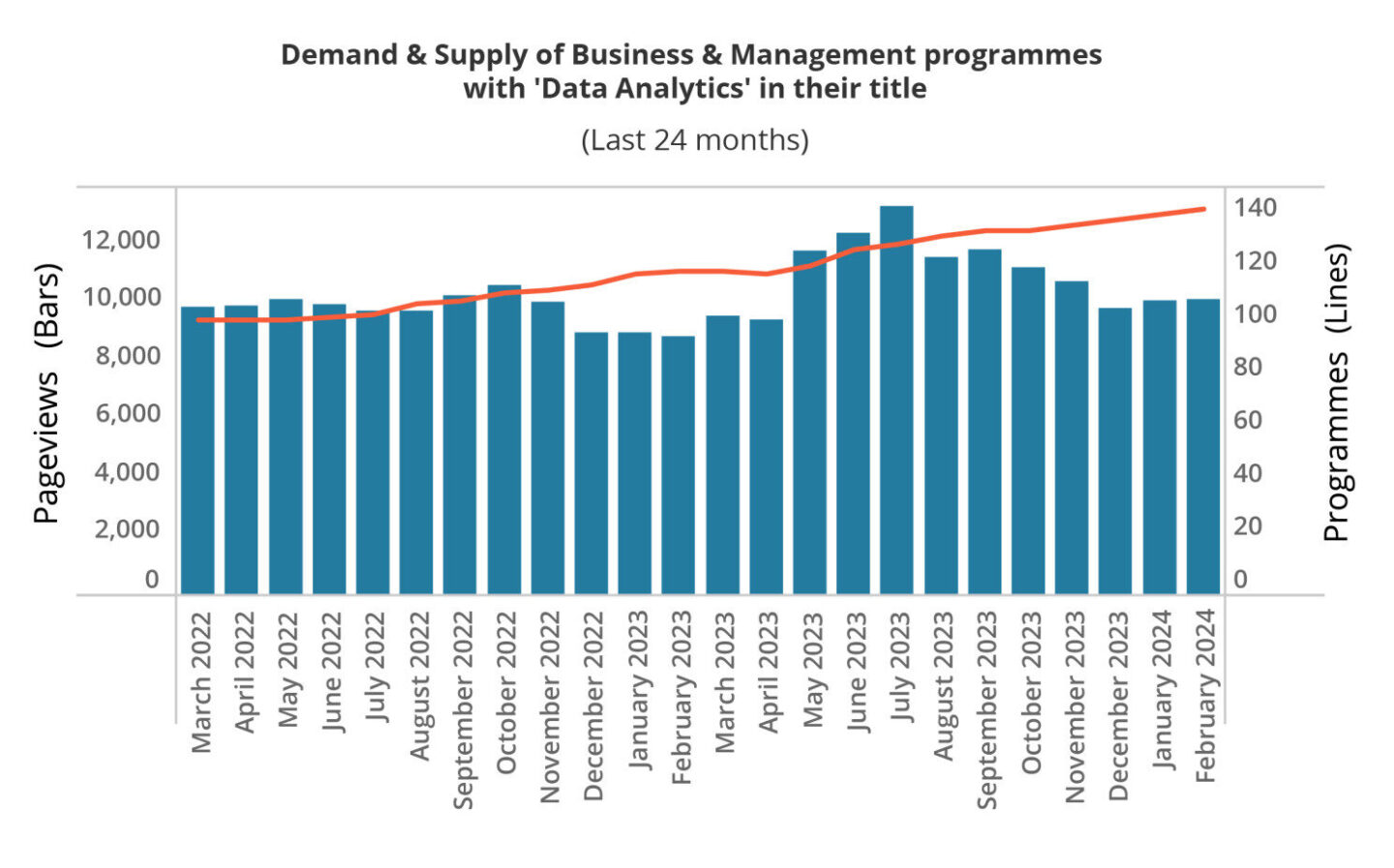
It is also worth noting which destinations are likely competitors when offering a programme containing either of the keyword options. Most keyword programmes at a Master’s level are offered in an on-campus format and supplied by institutions based in the US and the UK; however, when considering student interest for programmes containing these keywords, then institutions based in Europe also appear to be popular. This becomes particularly apparent when assessing relative demand (coloured bars) and relative supply (black vertical lines) to reveal what we call market opportunity. This metric suggests that despite the US and the UK being large suppliers, the potential for offering new programmes with these keywords is limited due to oversaturation of student interest, while European destinations have better opportunities to do so.
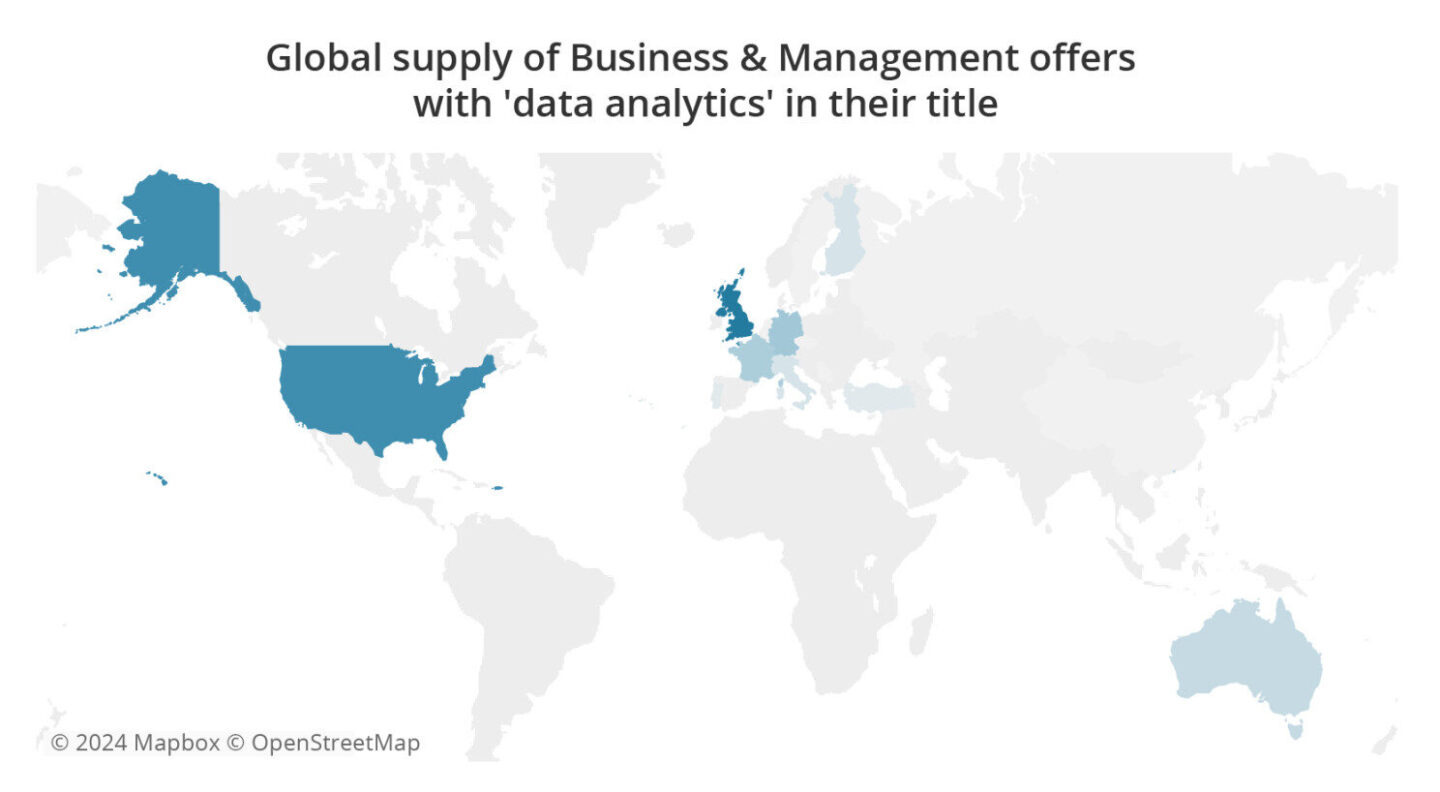
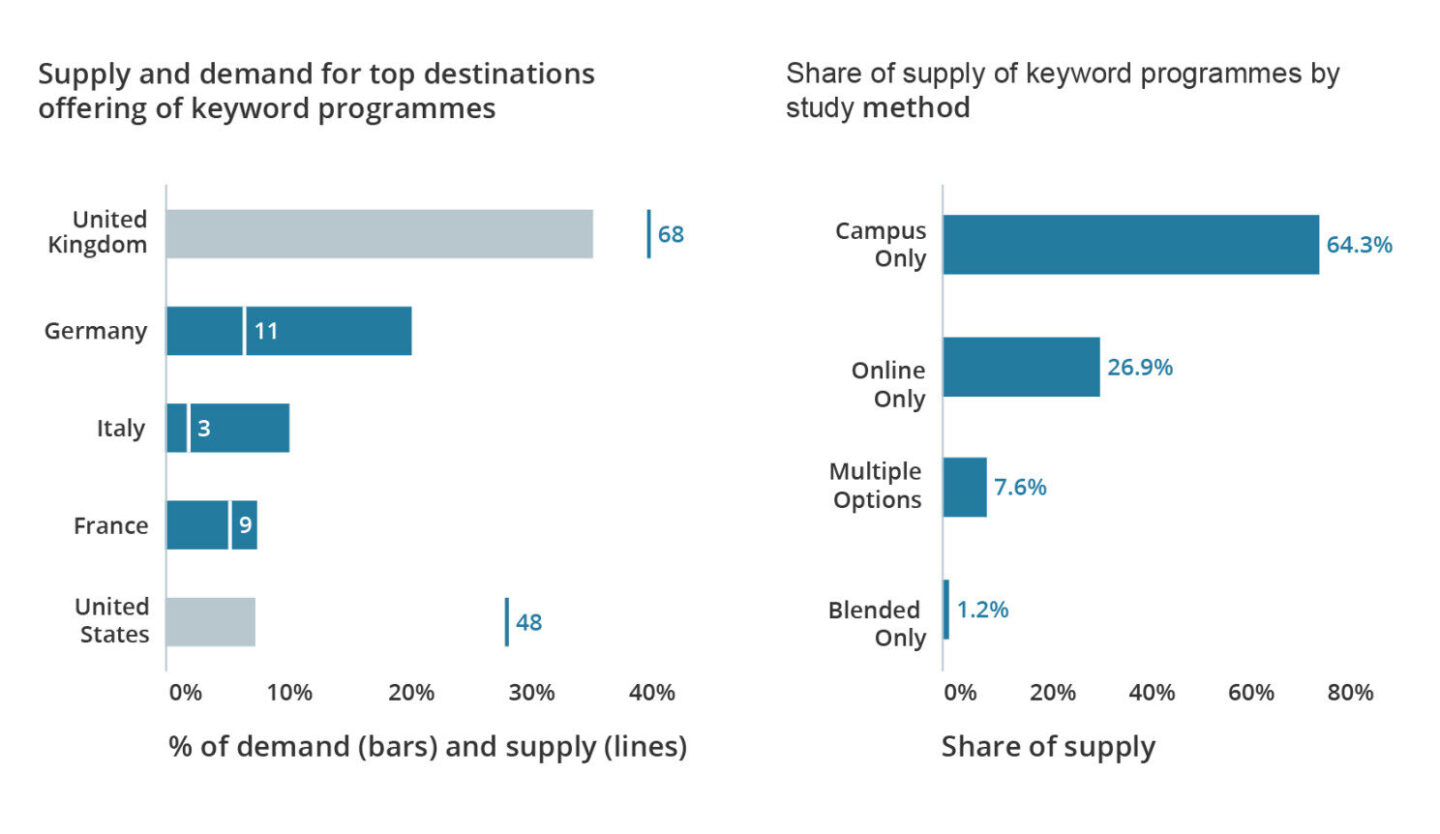
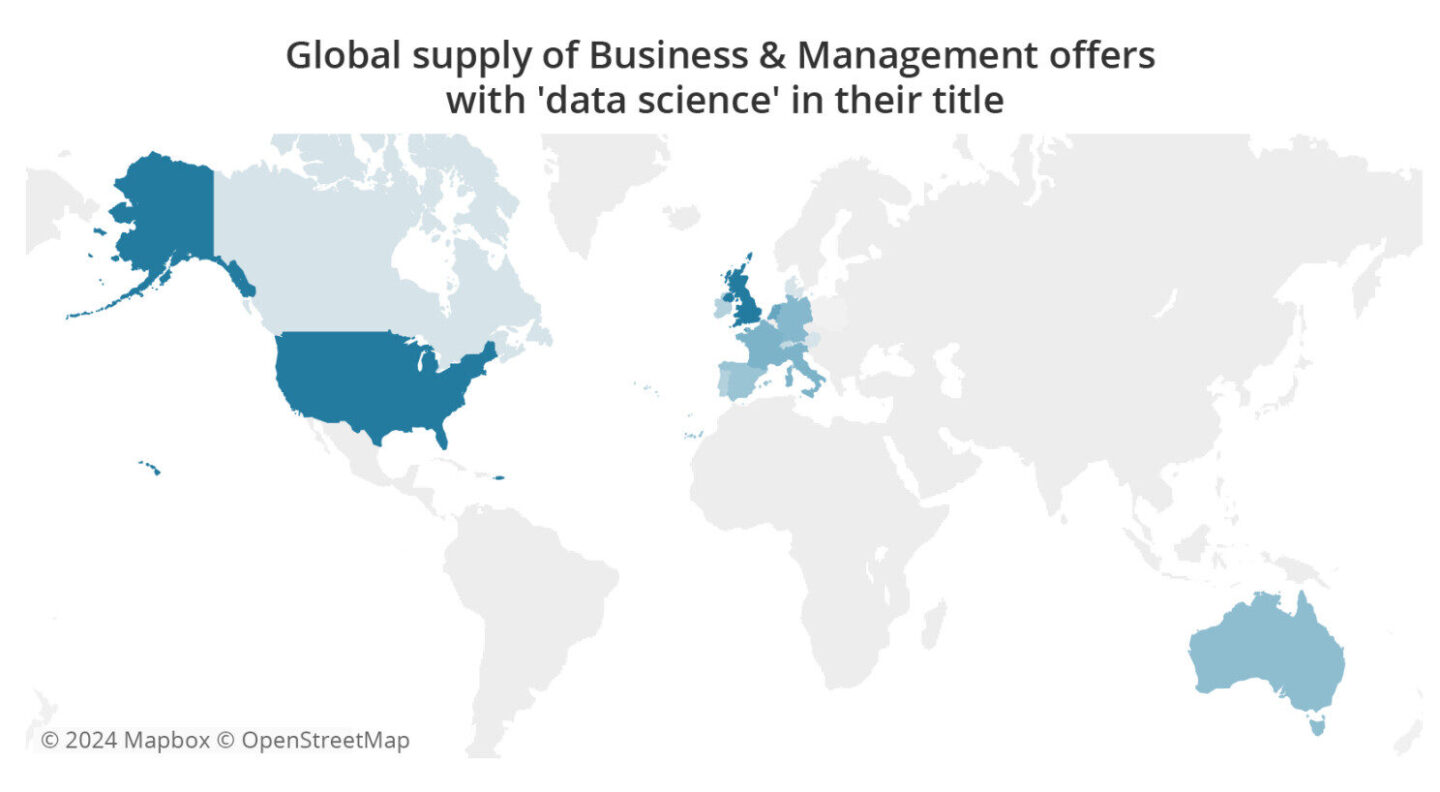
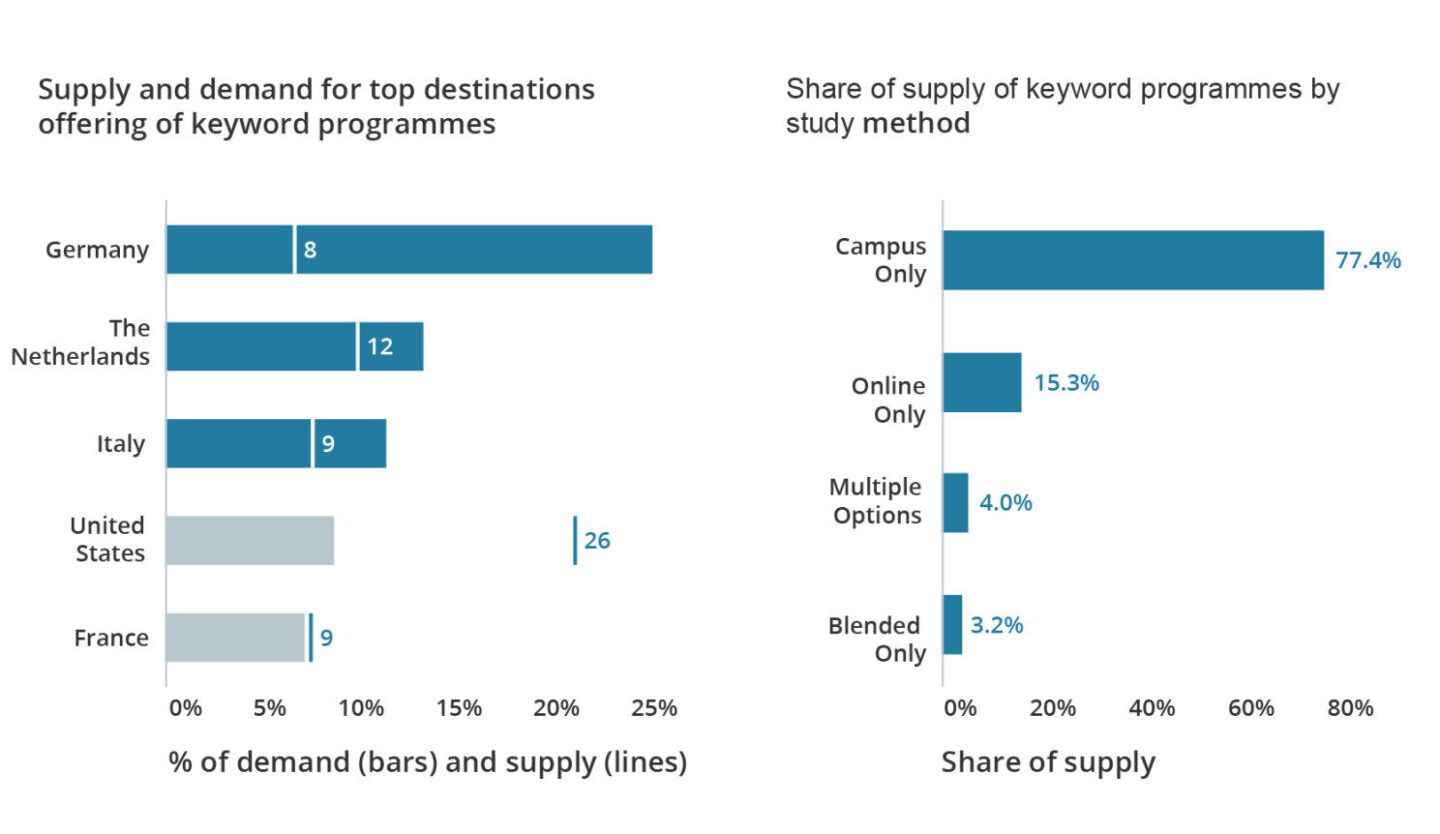
Popular programme titles
Beyond this, it is also worth considering which programmes that have adopted either keyword option are commonly used and assess whether successfully attract the interest of students.
For instance, Master’s programmes entitled ‘Data Science and Business Analytics’ marries both keyword options into one, are commonly named, and appear to attract the highest rate of pageviews per programme offered.
Meanwhile, a Business programme that is simply named ‘Data Analytics’ does not appear to garner the most student interest, despite it being the most supplied. This might imply that such a title is too vague for a prospective student wanting to study a Business programme that contains analytical components. In contrast to this, programmes entitled ‘Data Analytics for Business’, although lower in supply, instead indicate more clarity about what a student hopes to learn and attracts more student interest.
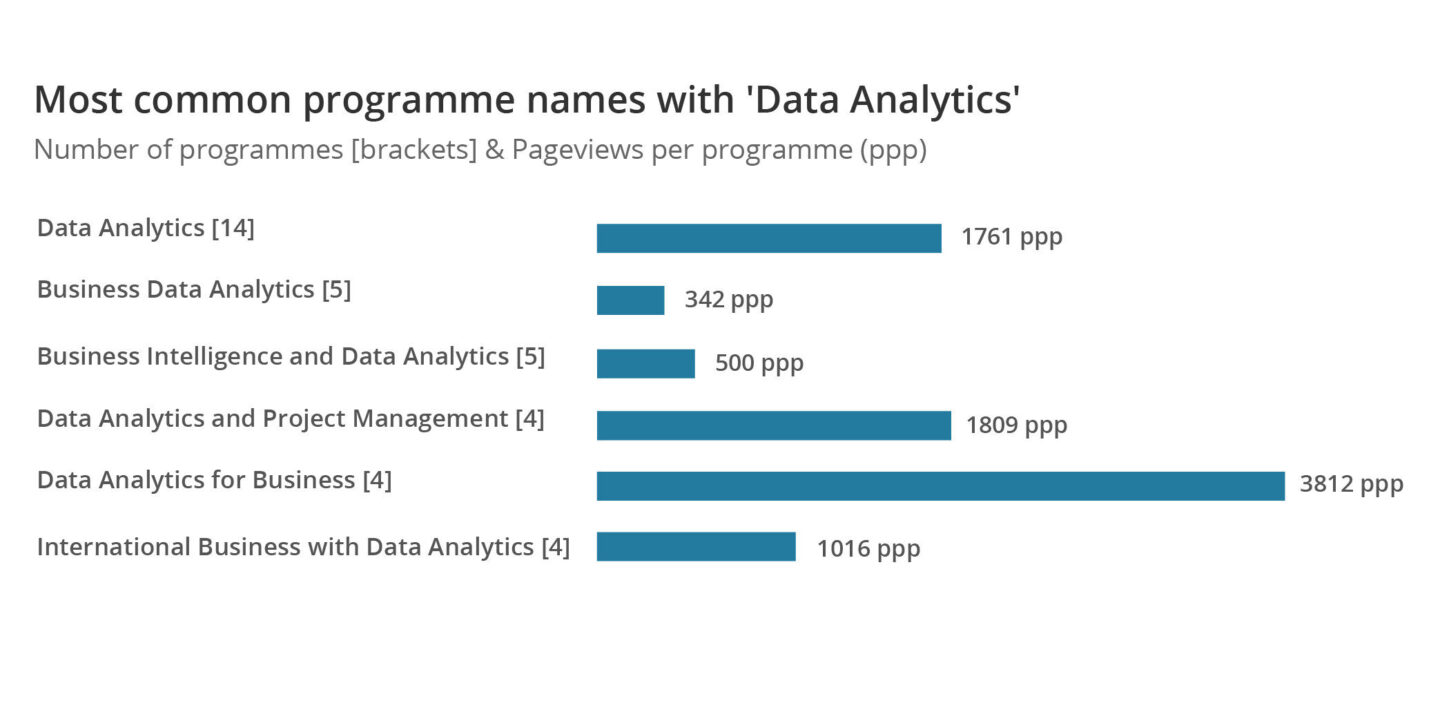
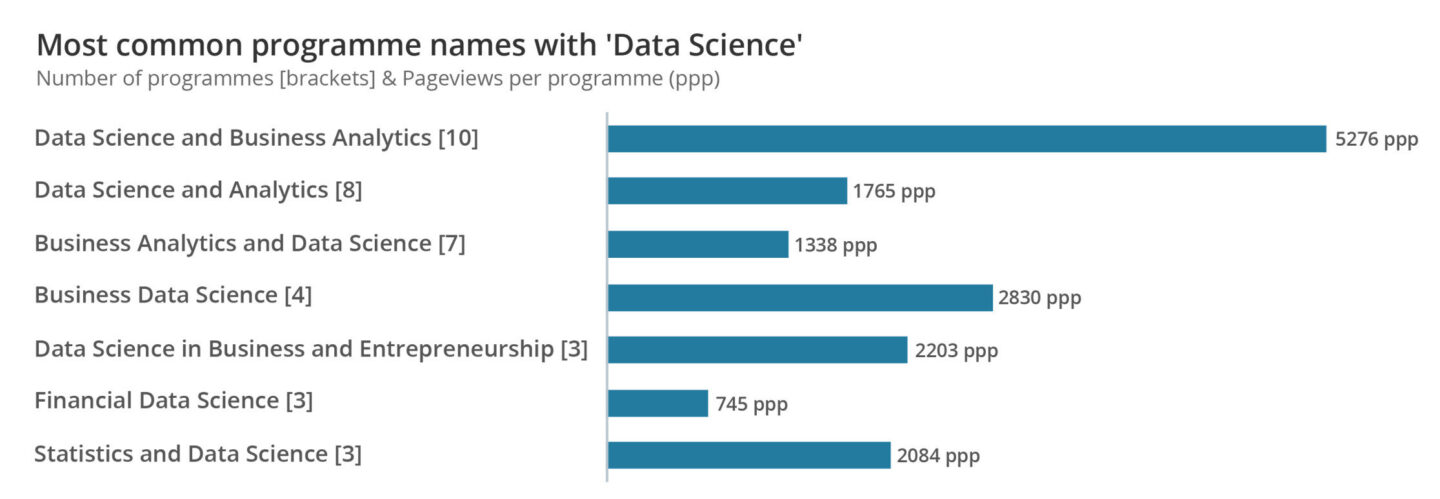
Programme title length
A last point that institutions should take into account is the length of their programme’s title. The analysis performed by Ambroziak (2023) is an exceptional example of how this may impact students considering your programmes.
In her study on the factors that influence user engagement with study programmes on Mastersportal, Ambroziak concluded that the longer a study is titled, then the lower the number of clicks such studies would receive on the website. This indicates that search engine-based title tags are not suitable for study programmes on website search result pages, highlighting the necessity of conducting research within relevant contexts.
An example where this might be the case is from the above figures on common titles and their performance. This shows that programmes entitled ‘Data Science for Business and Entrepreneurship’ or ‘International Business with Data Analytics’ indicated a relatively lower rate of pageviews per programme compared to other commonly named programmes.
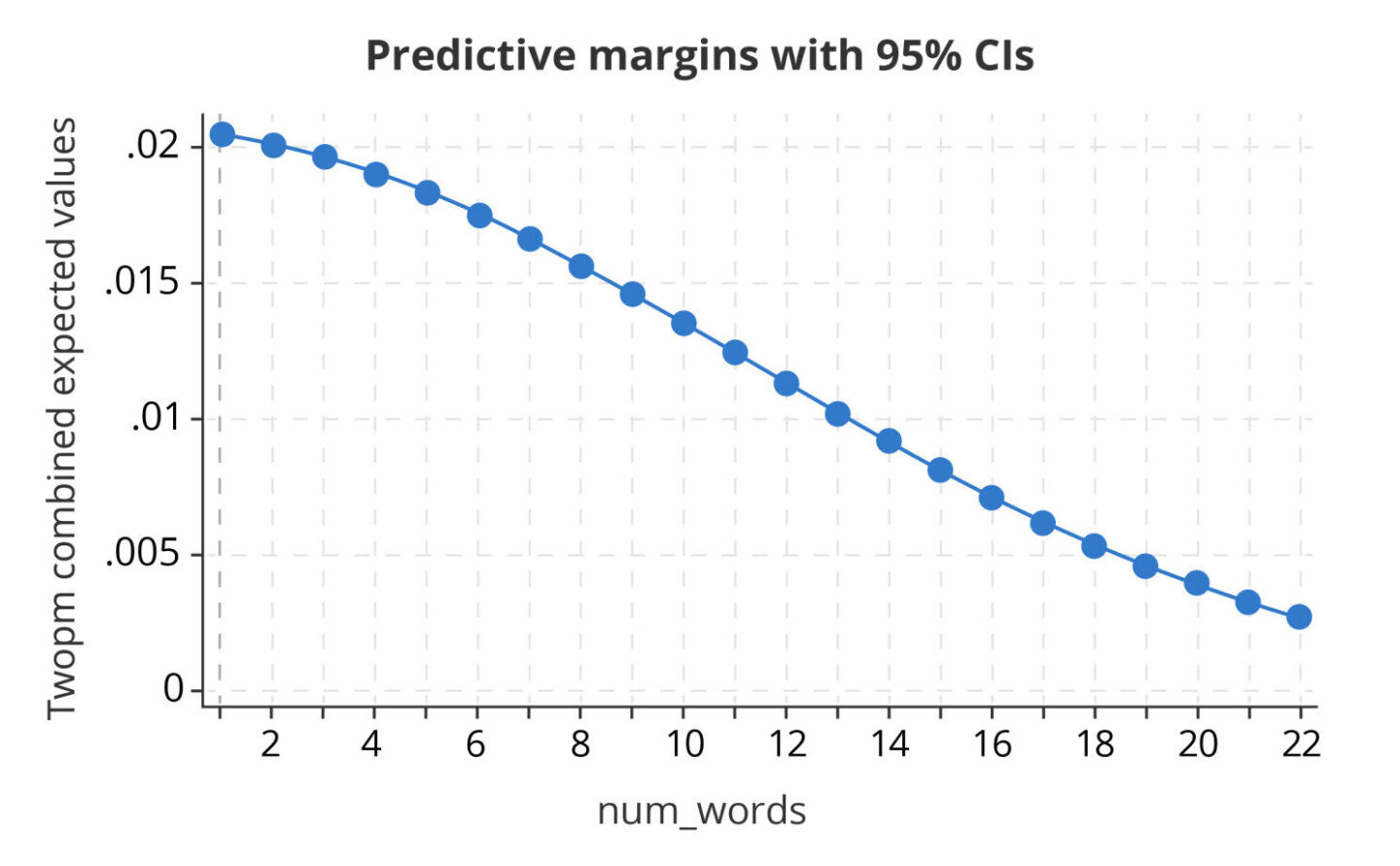
An example where this might be the case is from the above figures on common titles and their performance. This shows that programmes entitled ‘Data Science for Business and Entrepreneurship’ or ‘International Business with Data Analytics’ indicated a relatively lower rate of pageviews per programme compared to other commonly named programmes.
Note: This analysis is based on Studyportals’ unique dataset, collecting the online search activities of millions of prospective, international students looking for their future programme of study. The visuals shown for the analysis form a part of the Portfolio Development Dashboard, an interactive tool that gives these and various more indicators on student interest and the competition environment of higher education. For more on this topic, especially trends on your country and region, feel free to reach out to one of our expert consultants.


